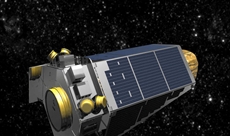Nasa recovers Kepler spacecraft from emergency mode
12 Apr 2016
Mission operations engineers at its various centres have, in a joint effort, successfully recovered the Kepler spacecraft that drifted and entered an emergency mode, and stopped sending signals to Earth.
 On Sunday morning, the spacecraft reached a stable state with the communication antenna pointed toward Earth, enabling telemetry and historical event data to be downloaded to the ground, Nasa stated in a release.
On Sunday morning, the spacecraft reached a stable state with the communication antenna pointed toward Earth, enabling telemetry and historical event data to be downloaded to the ground, Nasa stated in a release.
The spacecraft is now in good health and operating as expected. However, it is operating in its lowest fuel-burn mode as much fuel has been wasted, it added.
The mission has cancelled the spacecraft emergency, returning the Deep Space Network ground communications to normal scheduling, for the first time after 4 April.
On 7 April the mission declared a spacecraft emergency, which provides priority access to ground-based communications at the agency's Deep Space Network and mission operations began the manoeuvre to orient the spacecraft to point toward the center of the Milky Way for the K2 mission's microlensing observing campaign.
The spacecraft is nearly 75 million miles from Earth, making the communication slow. Even at the speed of light, it takes 13 minutes for a signal to travel to the spacecraft and back, a Nasa statement explains.
The last regular contact with the spacecraft was on April 4. The spacecraft was in good health and operating as expected.
Once data is on the ground, the team will thoroughly assess all on board systems to ensure the spacecraft is healthy enough to return to science mode and begin the K2 mission's microlensing observing campaign, called Campaign 9. This checkout is anticipated to continue through the week.
Gravitational microlensing enables scientists to search for exoplanets that are too distant and dark to detect any other way.
For this experiment, astronomers rely on the effect of a familiar fundamental force of nature to help detect the presence of these far out worlds - gravity. The gravity of massive objects such as stars and planets produces a noticeable effect on other nearby objects.
But gravity also influences light, deflecting or warping, the direction of light that passes close to massive objects. This bending effect can make gravity act as a lens, concentrating light from a distant object, just as a magnifying glass can focus the light from the sun.
Scientists can take advantage of the warping effect by measuring the light of distant stars, looking for a brightening that might be caused by a massive object, such as a planet, that passes between a telescope and a distant background star. Such a detection could reveal an otherwise hidden exoplanet.
The majority of these exoplanets have been found snuggled up to their host star completing an orbit (or year) in hours, days or weeks, while some have been found orbiting as far as Earth is to the sun, taking one-Earth-year to circle. In fact, some studies suggest that there may be more free-floating exoplanets than stars in our galaxy.
NASA's K2 mission will survey millions of stars toward the center of our Milky Way galaxy in search of distant stars' planetary outposts and exoplanets wandering between the stars.
While in recovery mode, Earth-based observatories participating in Campaign 9 will continue to make observations as Kepler's health check continues. The K2 observing opportunity for Campaign 9 will end on 1 July, when the galactic center is no longer in view from the vantage point of the spacecraft, Nasa stated.



















